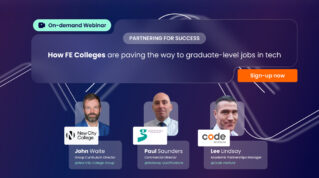Today’s business landscape makes the need for diversity more urgent than ever. Employers have been warning for years that a lack of digital talent is holding back growth and putting the UK and other European economies on the backfoot compared to North America and Asia. McKinsey estimated a shortfall in the EU of between 1.4 million and 3.9 million “career-ready” people by 2027.
As any Google search for “software jobs” will tell you – the opportunities are there, whether you live in Lincoln or London. So why has it been so challenging to close the digital gap and equip people with skills to kickstart a career in tech?
There are two main reasons. For decades, the path to delivering those skills has been a degree in computer science, which is costly, involves travelling to campus, and takes three years to complete (by which time a lot you have been taught is outdated). The second barrier to closing the digital skills gap is the prejudice that tech is a profession for young, able-bodied, white men – and that women, ethnic minorities, or disabled groups have no place in the industry.
It certainly looks that way. In the UK, just a quarter of tech workers belong to an ethnic minority group, while gender minorities represent only 28%, less than a third. While we lack specific figures for disabled groups in tech, we know they are poorly represented in the workforce and a third less likely to move into work than non-disabled people.
This is not what employers want.
Employers’ Perspective
As part of this white paper, we talked to a handful of UK&I tech employers—SMEs and global organisations, including diversity leaders from the BBC, AXA, and tech giant Red Hat. They tell us with one voice that they are desperate to hire talent from these under-represented groups because it is morally right and builds more rounded and innovative teams.
How to Deliver Diverse Tech Talent at Scale
The courses supported by Code Institute are inherently more diverse than the traditional BSc in Computer Science. They are shorter–usually no more than a year–and are taught online, making them accessible to a large number of people excluded by the face-to-face, timetabled model of traditional Further and Higher Education.
The Government is urging institutions of Further and Higher Education to pave the way for a more diverse pool of talent in technology and other areas by moving from the rigidity of the classroom to a more flexible delivery model.
Most FE and HE colleges lack the resources to develop, teach, or scale courses in software development that combines a rigorous and relevant syllabus with a well-organised support framework that has safety nets built in for students who may be struggling.
The colleges in England that have started offering courses supported by Code Institute find they can hardly keep up with demand and are hiring additional staff to launch more or larger cohorts.
Code Institute, Gateway Qualifications and four colleges of Further and Higher Education – Westminster Adult Education Service, University Centre Peterborough, City of Bristol College and South Staffordshire College have collaborated on this white paper. Join us as we take a forensic look at how they used technology in the shape of platform, curriculum content and support to deliver diverse tech talent at scale while delivering the quality and outcomes employers need.

Learn from FE & HE Colleges Leading the Way
Westminster Adult Education Service (WAES) is currently the only Further Education provider in England to use three Code Institute products to support their delivery of three courses: the two Gateway Qualifications Diplomas at Level 3 and Level 5, and a Full-Stack Software Developer: Skills Bootcamp.
Alison Muggridge, Assistant Principal Curriculum and Quality at WAES partnered with Code Institute to create a 16-week bootcamp as a response to GLA’s [Greater London Authority] bootcamp funding for software developers. The Bootcamp enables WAES to attract local or at least regional students from black and ethnic minorities, females, single parents, carers, anyone with a disability and/or the under-24s and over-50s. Alison says that “all our Bootcamp learners have at least one, and mostly two of those characteristics.”
Her colleague Waqas Ahmed, Head of English, Maths, Digital, and Inclusion, is tasked directly with the delivery of the Code Institute products and speaks of the ways they are scaling up across the board. “The second Bootcamp cohort started at the beginning of October with 23 students. It was heavily over-subscribed. We also started another Level 5 cohort in March; a further two are planned between now and the end of the academic year. We launched our first Level 3 cohort in April with 17 learners. A larger group of 22 started at the end of October, and another cohort is scheduled for spring 2024. So this is really taking off”, he says.
In January 2023, University Centre Peterborough (UCP) added a new qualification to its mix of tech courses—the Gateway Qualifications Level 5 Diploma in Web Application Development as a way to get people skilled or re-skilled for a future in tech relatively quickly.
Peter Wright, HE Manager of Science, Technology and Resources at UCP, shares that “the course seems to be hitting parts of the workforce that traditional computer science degrees cannot reach – as was our intention. The gender balance in UCP’s cohorts is better than the average in tech. At the moment, around 35% of our students are female, and in the next cohort, that percentage is higher, but of course, we want to get closer to that 50:50 split,” he adds.
With the success of the Level 5 Diploma, Liz Knight, UCP Academic Director, says “adding Bootcamp and the Level 3 Diploma in Software Development to the mix would create a diverse and inclusive pathway within the Inspire Education Group. Definitely a great plan for the future.”
Pasquale Fasulo, Director of Further and Higher Education at City of Bristol College, has offered the Gateway Qualifications Level 5 Diploma in Web Application Development since October 2021. He has since hired a graduate of the course to help run it. In tandem with scaling up Level 5 delivery, City of Bristol College intends to launch its first cohort for the Gateway Qualifications Level 3 Diploma in Software Development and pave the way to a new career and a new future for an even wider group of people.
Chris Hopkins, Faculty Director (Creative Arts, Digital & IT) at South Staffordshire College (SSC), “we wanted SSC to build a portfolio of qualifications for 19+ learners looking for a change in direction. The Gateway Qualifications Level 5 Diploma in Web Application Development gives that opportunity to people from diverse backgrounds with different skill sets.”
His colleague Adam Cross, Curriculum manager for Computing and Digital, is delighted with the 50:50 gender split in the latest cohort that started in September 2023. “Code Institute has stepped into the breach to fill that skills gap, and so people are switching over to do this. This is why SSC and other colleges are getting the numbers,” he says.
Funding
Both qualifications allow learners to access funding via the Advanced Learner Loan for Level 5 learners and the Adult Education Budget/ National Skills Fund for Level 3 learners. The Level 3 qualification is also funded via Free Courses for Jobs. On the other hand, the Full-Stack Software Developer: Skills Bootcamp funding varies depending on the opportunity.
Software is about much more than code; it’s about how we do our finances, how we travel, how we communicate, how we entertain ourselves. This is a future that belongs to all of us – and must be as diverse as we are.

















Your thoughts